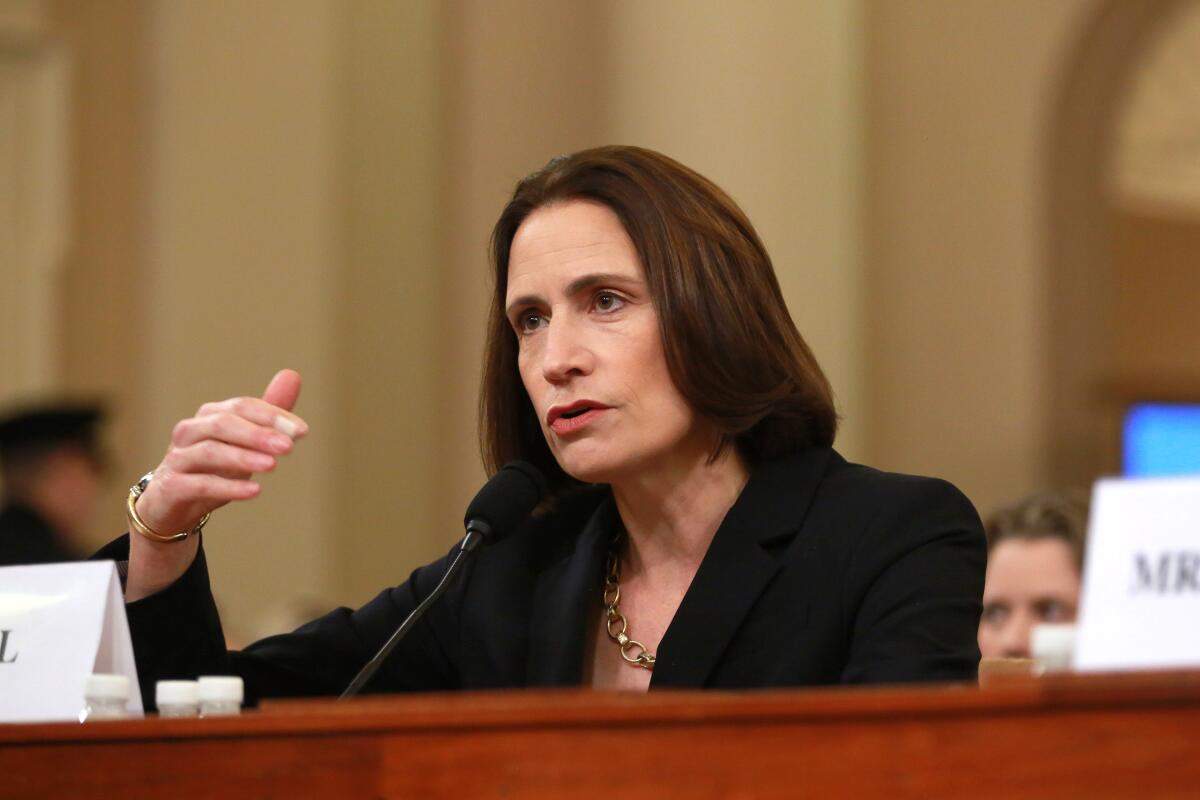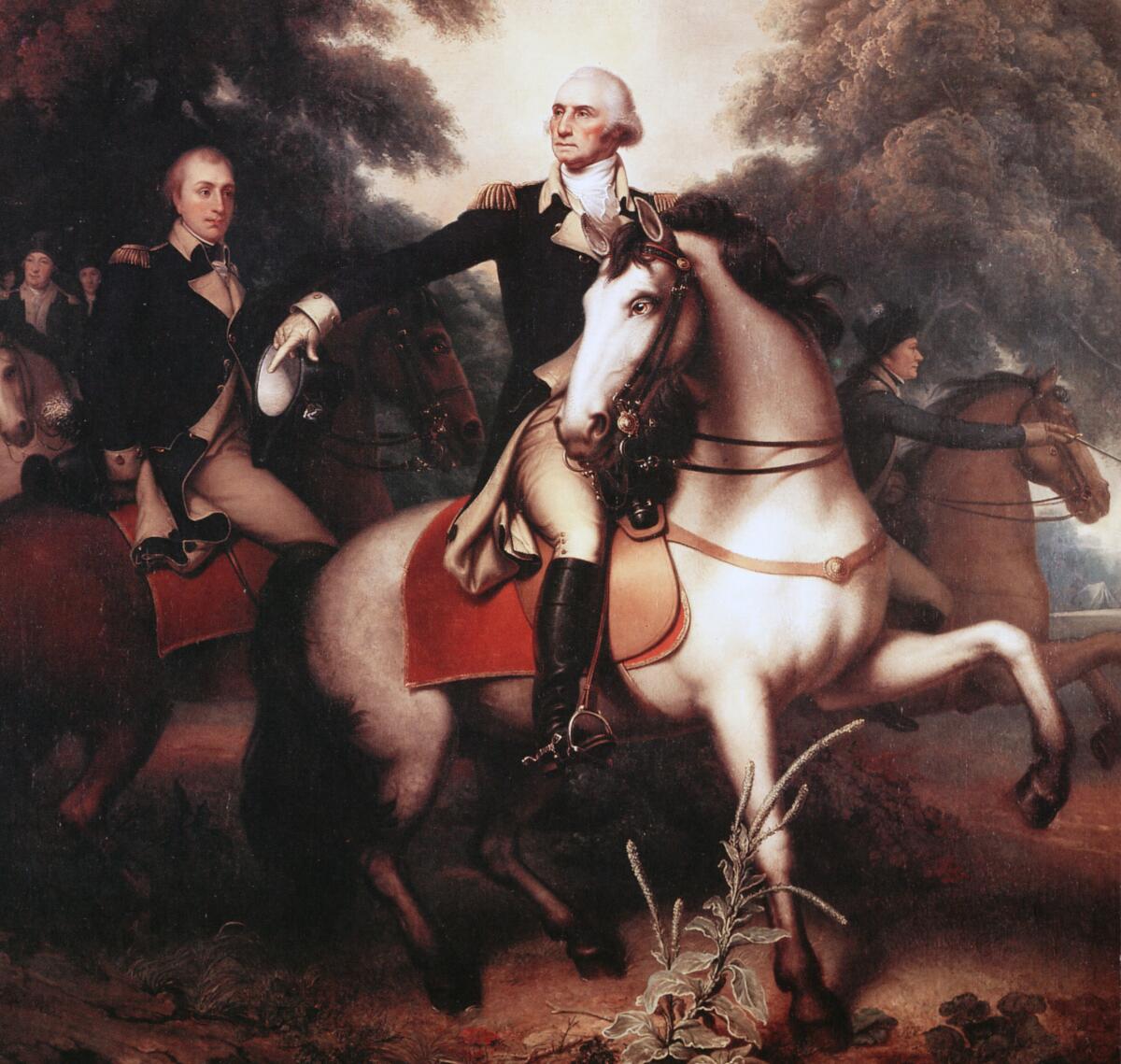
President Trump’s suggestion he could bid for a third term has Kremlinologists revisiting a turning point in Russian history.
Could it happen here?
In 2008, a constitutional provision limiting presidents to a maximum of two terms forced Russia’s strongman, Vladimir Putin, to step aside. He did so with a plan. That year, Putin helped install an ally in his place at the presidential palace through a questionable election. His replacement, Dmitry Medvedev, appointed Putin prime minister.

As his plan unfolded, the U.S. National Intelligence Council conducted an assessment of the likelihood of Putin’s return to power. He managed to do so when success was not guaranteed. While in the temporary harbor of his prime ministership, Putin secured a constitutional amendment and returned to the presidency four years later.
The analyst behind that National Intelligence Council assessment, Fiona Hill, would later serve as Russia director at the National Security Council for Donald Trump during his first presidential term.
You’re reading the L.A. Times Politics newsletter
Michael Wilner and Anita Chabria bring insights into legislation, politics and policy from California and beyond. In your inbox twice per week.
You may occasionally receive promotional content from the Los Angeles Times.
“There were all these discussions about Putin becoming the head of the National Security Council, or a privy council — some kind of new role that would be created,” Hill told The Times in an interview.
Ultimately, “one of the reasons used to justify Putin coming back was the fallout from the financial crisis, that the world was becoming a much more dangerous place,” said Hill, now serving as chancellor of Durham University in England. “So you could imagine Trump taking a similar move — already he’s using all of these wartime statutes for deportations, revoking visas, national security exceptions on tariffs, et cetera — you can see the line of travel there justifying this.”
A more complicated path
The 22nd Amendment of the U.S. Constitution is plain in its language: “No person shall be elected to the office of the President more than twice.” But Trump nevertheless said this week that he is “not joking” about exploring ways to run for a third term or otherwise remain in power.
Putin was able to relocate to another, powerful position — prime minister — while Medvedev served as caretaker in the presidency. That has been a playbook followed by other world leaders who maintained power in the face of term limits, such as Turkish President Recep Tayyip Erdogan, who made the opposite switch. But a similar role doesn’t exist in the United States for Trump to occupy with any significant authority, Hill noted.
Even conservative legal scholars and the president’s political allies struggle to see a path forward for Trump. Litigation over the matter would probably come early in the election cycle — as early as next year, if Trump were to file initial paperwork to raise money for another bid — and reach the Supreme Court. Decisions on ballot access would be made at the local level, state by state, and internal Republican opposition has already flared over the prospect of a third Trump term.
“I don’t think this is a serious possibility, or a serious suggestion,” said William Patrick Baude, a prominent conservative legal scholar at the University of Chicago Law School. A paper published by Baude in 2023, arguing that Trump was ineligible to run for office because he had engaged in insurrection, became the basis for lawsuits across the country that ultimately ended up at the Supreme Court.
“I don’t think it would or could happen,” Baude added.
An Eisenhower loophole?
Only Franklin D. Roosevelt sought and won four terms in office. His historic tenure prompted a broad coalition of society to come together and codify a two-term limit for presidents in the U.S. Constitution — a prohibition that, before Roosevelt, had existed only in tradition.
After the 22nd Amendment was enacted in 1951, the first president to be constitutionally barred, Dwight D. Eisenhower, joked about a potential loophole in the system.
“You know, the only thing I know about the presidency the next time is this: I can’t run,” he said. “But someone has raised the question that were I invited, could I constitutionally run for vice president, and you might find out about that one. I don’t know.”
The 12th Amendment states that individuals who are not eligible for the presidency are also not eligible for the vice presidency.
“The framers were actually not pro-term limit — they thought that stability in office was generally a good thing, so long, of course, that the voters approved,” said Andrew Rudalevige, a professor of government at Bowdoin College. “But now, with the 22nd Amendment, the mechanism would be to amend the Constitution. Otherwise, if you are literally overriding the plain text of the Constitution, you are no longer in a constitutional system.”
Washington would disapprove
The conventional wisdom about George Washington is that he intended to make a statement to the world — about democracy, power and the rule of law — by stepping down after two terms as the nation’s first president.
That was partially the case, but there was another reason the founding father chose to step aside. At the end of his first term, Washington was 60, and the old soldier was starting to feel old.

Even before seeking a second term, Washington told Thomas Jefferson he wasn’t feeling up for the job. Washington suggested retirement, prompting Jefferson to plead with him to reconsider, historical records show.
“He really felt himself growing old, his bodily health less firm, his memory, always bad, becoming worse, and perhaps the other faculties of his mind shewing a decay to others of which he was insensible himself,” Jefferson wrote, capturing his correspondence with Washington in 1792. “I felt all the magnitude of the event.”
Despite his infirmities, Washington served his nation again by running for a second term. But he stopped there, setting the precedent that has become fundamental to the American presidency and is now under scrutiny by Trump and his allies.
Trump will be 82 at the end of 2028 — older than his predecessor, Joe Biden, was when he sought a second term, only to be pressured out of the race due to concerns over his age.
“Look at how incredibly unpopular Joe Biden got, not really for things he did, but just for being old — for being old, and looking old and acting old,” said Elaine Kamarck, director of the Center for Effective Public Management at the Brookings Institution. “Trump is, in fact, old, and sometimes muddles his words and can’t get things straight, and doesn’t seem to know what’s going on. He will face a Bidenesque stream of attack.”
Putin was just 56 in 2008.
What else you should be reading
The must-read: A Trump bid for a third term? ‘It could get messy’
The TK: Trump’s axing of L.A. federal prosecutor part of broader war on perceived legal enemies
The L.A. Times Special: California vs. Trump: What it’s like to be the attorneys on the front lines
More to come,
Michael Wilner
—
Was this newsletter forwarded to you? Sign up here to get it in your inbox.